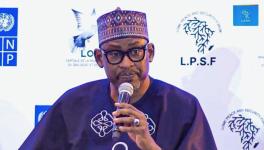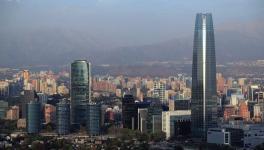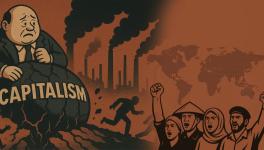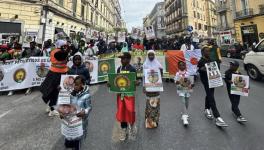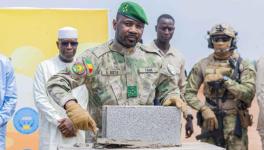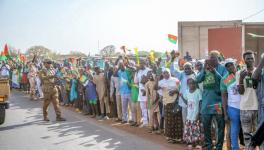Banners of Solidarity Fly High at the Third Pan-Africanism Today Conference in Ghana
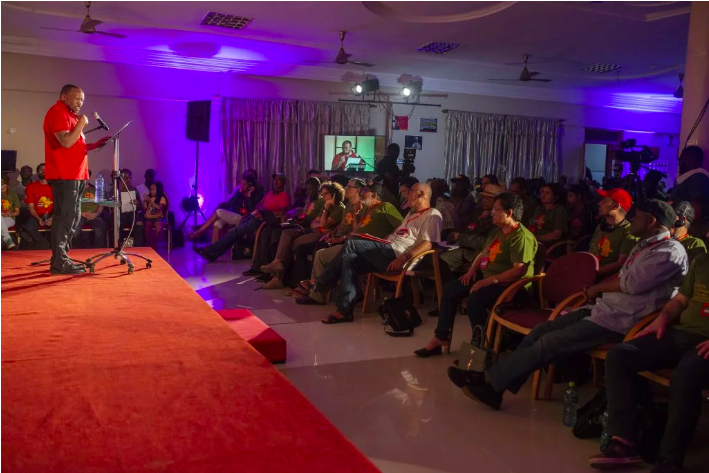
Photo: Ihsaan Haffejee/New Frame
“Each generation must discover its mission, fulfill it or betray it.” For the 400-odd militants-activists at the Third Pan-Africanism Today conference, these words of Frantz Fanon, posed as an exhortation and a challenge by S’bu Zikode, leader of the Abahlali baseMjondolo (Shack Dwellers Movement of South Africa), reflected the spirit of the historic meet in the Ghanian town on Winneba.
The third edition of the conference began on September 20, with representatives of over 60 countries congregating to discuss the pressing challenges faced by the working class in the continent and across the world, and the ways to overcome them. The conference that will go on till September 23 will see discussions by various commissions on the potential for greater solidarity among the organizations and movements of the region. The areas of discussion include: The new scramble for Africa; Trade unions and the struggle against neoliberalism, Struggles of the urban poor, Peasant struggles for food sovereignty and agrarian reform; and The battle of ideas.
The conference began with a visit by the delegates to the Elmina Castle, one of the centres of slave trafficking from Africa for over 400 years. Here, the militants-activists not only reflected on the centuries of systemic exploitation but also took a solemn vow to unite in their efforts to relentlessly battle the modern manifestations of this oppression.
Addressing the delegates later in the day, senior leader of the Nepal Communist Party and the country’s former Prime Minister, Madhav Kumar Nepal, exhorted the delegates to join hands in revolutionary solidarity in the battle against imperialism and capitalism.
Tracing the revolutionary history in the country, which he noted had never been colonized, Madhav Nepal went on to talk about the path of the communist movement in Nepal and the unity achieved there. Pointing out the urgency of the need to free Africa from the clutches of imperialism and colonialism, he called for greater solidarity between Asia, Africa and Latin America.
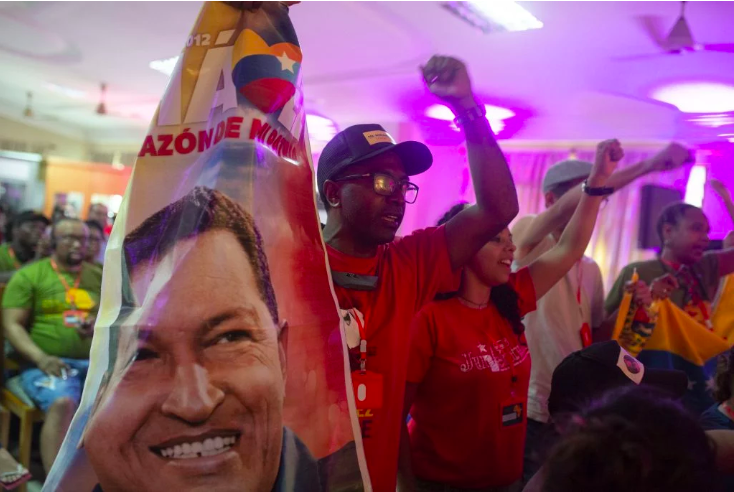
(Photo: Ihsaan Haffejee/New Frame)
Unity and solidarity – between the toiling masses of the continent – was undoubtedly the defining theme of the meet. As Cosmas Musumali of the general secretariat of the Zambian Socialist Party, and the political leadership of Pan Africanism Today (PAT) explained, this solidarity underlies the very idea of the PAT. Around this conference have also emerged a number of novel experiments in organizing the various sections who are waging struggles in the continent. There are many who would lay claim to Pan-Africanism for their own ends, he noted, including the bourgeoisie. The way to combat this, he added, citing Kwame Nkrumah, was the realization that a meaningful Pan-Africanism would have to be anti-capitalist and anti-imperialist.
“The class struggle in Africa is a single one,” he noted, referring to the need for relentless movements “unifying the struggles of the masses against capitalism and imperialism,” which is the theme of the conference.
A key question for the speakers who introduced the five areas of discussion was the building of bonds between those fighting the hegemony of capitalism and imperialism. Irving Jim, general secretary of the National Union of Metalworkers of South Africa (NUMSA), put this issue on the centre stage with a call to build the kind of alliances that amplify and magnify each others’ struggles. Referring to NUMSA’s action in South Africa against that forced it to retreat from anti-worker measures in Mozambique, he added that the successful building of solidarity and unity was the key to building socialism in Africa and the world.
Jim’s intervention also noted the key role of organizations at a time when their role is being relentlessly undermined by global narratives. The question of solidarity was also incomplete without the battle against xenophobia, which time and again has been used to turn worker against worker, and divide the exploited to the benefit of the capitalists and ruling sections, he said.
The call for organizations to unite was also echoed by Zikode, who channelling the experiences of his movement, talked about the sacrifices and the struggles in urban areas. How do we see our struggle, Zikode asked, at a time when so many cities have been taken over by the mafia; when the unemployed youth of these cities are being hired by politicians to target their own people. Elaborating on his organization’s philosophy of ‘Living politics”, he talked about how their struggle was not one for the delivery of services but for human dignity itself. “We have resisted every attempt made to attack our humanity,” he declared, adding that at a time when cities are militarizing against their own people, trade unions, popular movements, indigenous communities, and slum dwellers’ movements all needed to work in tandem. “Our struggles cannot be confined,” he said.
From many other sites of struggle too came voices bearing the banner of resistance. Speaking about agrarian reform and the struggles of the peasants, Immanuel Nkansah of the General Agricultural Workers Union of Ghana laid before the delegates the challenge of agrarian reform and how it would be the basis of further struggles. Delineating the various processes and developments in the sector, he examined the factors that affect the rural peasant, including issues of land ownership, inputs and production relations. The next question, he pointed out, was how the different social forces could be galvanized to confront these global processes. Considering the vast scope of these processes and their global impact, whatever is won through struggles has to be defended through struggles too, he said. The way forward would have to be the linking up of urban and trade union struggles with those on the countryside so that these victories won could be defended.
‘United we win, divided we fall’, was a slogan that time and again echoed through the hall where the militants gathered. The understanding that true unity depends on the ability of the working class to win the battle of ideas underlined the discussion on the ideological and cultural apparatus of the left. Khadija Ryadi of the Democratic Way of Morocco spoke about how the impact of global capitalism on sectors like education and culture is key to understanding the battles of the coming years, From the possibility of revolutionary art and an enlightened education to the question of interpreting and radicalizing tradition, the challenges before the left are manifold. At a time when the right wing is on the rise in every sphere of society, exploring the possibility and promise of an alternative is the task before the Left, Ryadi said.
One of the central challenges faced by the Pan-African movement is the new scramble for Africa. This is in many ways as sustained and devious as the first one. Elaborating on this race for Africa’s resources, both natural, and in terms of its people, Cosmos Musumali pointed out how Africa, in a couple of decades, would have a much larger share of the global population and the working population. Even today, Africa remains a next exporter of capital, a trend that will be accentuated in the coming years. And it is in this context that the designs of global organizations, especially the US state department and foundations based in the US, on the young leaders and talent of Africa need to be exposed. The fight is not just for the resources of Africa but for the minds of its people as well.
For the nearly 400 militants from across the globe, these issues were not subjects of mere academic discussions but fragments of their lived experience, their everyday struggles. Throughout the day, through the music and slogans that were such an integral part of every discussion, what was evident were the strong bonds that held together the working people from around the world who had gathered in Ghana, the land of Kwame Nkrumah.
Over the next three days, the militants will deliberate on the methodologies and strategies to intensify the struggle against capitalism, both in Africa and around the world as part of the journey towards socialism.
Get the latest reports & analysis with people's perspective on Protests, movements & deep analytical videos, discussions of the current affairs in your Telegram app. Subscribe to NewsClick's Telegram channel & get Real-Time updates on stories, as they get published on our website.











